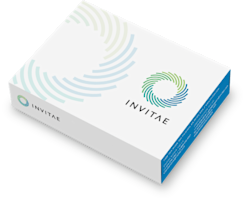
Invitae Cerebral Creatine Deficiency Panel
Test code: 06162 •
Test description
The Invitae Cerebral Creatine Deficiency Panel analyzes the three genes that are associated with defects in the biosynthesis or transport of creatine. This test is useful for the diagnosis of patients in whom L-arginine:glycine amidinotransferase (AGAT) deficiency, guanidinoacetate methyltransferase (GAMT) deficiency, or creatine transporter deficiency is suspected due to clinical symptoms or abnormal laboratory findings. Genetic testing of these genes may confirm a diagnosis and help guide treatment and management decisions.
Ordering information
Turnaround time:
10–21 calendar days (14 days on average)New York approved:
YesPreferred specimen:
3mL whole blood in a purple-top EDTA tube (K2EDTA or K3EDTA)Alternate specimens:
Saliva, buccal swab, and gDNA are also accepted.Learn more about specimen requirementsRequest a specimen collection kitClinical description and sensitivity
Clinical description:
The cerebral creatine deficiency syndromes are a group of three inherited disorders that affect the biosynthesis or transport of creatine, which leads to a deficiency of creatine in the brain that can be detected by MR spectroscopy (1H-MRS). Most patients develop intellectual disability and seizures.
Patients with L:arginine:glycine amidinotransferase (AGAT) deficiency have been diagnosed from 3 weeks to 25 years; however, symptoms may be present much earlier. Most patients with this disorder have varying degrees of intellectual disability and speech delay. More than half of patients have been reported with muscle myopathy, and approximately one-third have autistic features and behavioral disturbances. Seizures are a rare finding in this disorder. Patients with AGAT deficiency will have low urine and plasma guanidinoacetate, with low to low-normal plasma creatine. The urine creatine/creatinine ratio will be low normal. Creatine supplementation is used to treat individuals with AGAT deficiency. Onset of treatment and whether the patient is already symptomatic at the time of treatment can impact the effectiveness of creatine supplementation.
Patients with guanidinoacetate methyltransferase (GAMT) deficiency typically present from three months to three years of age. All patients have intellectual disability and seizures; these symptoms can range from mild to severe, with most patients having severe disease (~60%). Most patients will also have a movement disorder and behavior disorder. Symptoms can include dystonia, chorea, athetosis, ataxia, hyperactivity, autism, and self-injurious behavior. Patients with GAMT deficiency will have elevated guanidinoacetate in urine and plasma, with low plasma creatine, low to low-normal urine creatine, and a low to low-normal urine creatine/creatinine ratio. Creatine supplementation with ornithine supplementation and arginine restriction have been used to treat GAMT deficiency. Sodium benzoate may also be given to reduce glycine levels (elevated levels are a precursor of guanidinoacetate). Improvement of clinical symptoms have been reported in patients, but the degree of improvement may depend on the onset of therapy.
Patients with X-linked creatine transporter deficiency typically present within the first three years of life. Phenotypic features can range from mild to severe. All males have been reported with intellectual disability and speech delay. Behavior disorder is present in most males and can include attention deficit, autistic features, social anxiety, aggressiveness, stereotypic behaviors, impulsive behavior, and self-injurious behavior. Seizures have been reported in more than half of males with creatine transporter deficiency. Other symptoms observed include hypotonia, movement disorder, dysmorphic features, gastrointestinal disease, and (rarely) cardiac findings. Heterozygous females have been reported with features that range from asymptomatic to mild intellectual disability. Both males and females with creatine transporter deficiency will have normal plasma guanidinoacetate and creatine. Urine guanidinoacetate will be normal, with normal to elevated urine creatine. Males will have elevated creatine/creatinine ratios in urine while females may be normal to mildly elevated. Creatine supplementation along with arginine and glycine supplementation has been used to treat creatine transporter deficiency in both males and females, with mixed results. Earlier initiation of treatment may improve long-term outcome, but this has not been proven.
Assay information
Invitae is a College of American Pathologists (CAP)-accredited and Clinical Laboratory Improvement Amendments (CLIA)-certified clinical diagnostic laboratory performing full-gene sequencing and deletion/duplication analysis using next-generation sequencing technology (NGS).
Our sequence analysis covers clinically important regions of each gene, including coding exons and 10 to 20 base pairs of adjacent intronic sequence on either side of the coding exons in the transcript listed below, depending on the specific gene or test. In addition, the analysis covers select non-coding variants. Any variants that fall outside these regions are not analyzed. Any limitations in the analysis of these genes will be listed on the report. Contact client services with any questions.
Based on validation study results, this assay achieves >99% analytical sensitivity and specificity for single nucleotide variants, insertions and deletions <15bp in length, and exon-level deletions and duplications. Invitae's methods also detect insertions and deletions larger than 15bp but smaller than a full exon but sensitivity for these may be marginally reduced. Invitae’s deletion/duplication analysis determines copy number at a single exon resolution at virtually all targeted exons. However, in rare situations, single-exon copy number events may not be analyzed due to inherent sequence properties or isolated reduction in data quality. Certain types of variants, such as structural rearrangements (e.g. inversions, gene conversion events, translocations, etc.) or variants embedded in sequence with complex architecture (e.g. short tandem repeats or segmental duplications), may not be detected. Additionally, it may not be possible to fully resolve certain details about variants, such as mosaicism, phasing, or mapping ambiguity. Unless explicitly guaranteed, sequence changes in the promoter, non-coding exons, and other non-coding regions are not covered by this assay. Please consult the test definition on our website for details regarding regions or types of variants that are covered or excluded for this test. This report reflects the analysis of an extracted genomic DNA sample. In very rare cases, (circulating hematolymphoid neoplasm, bone marrow transplant, recent blood transfusion) the analyzed DNA may not represent the patient's constitutional genome.
You can customize this test by clicking genes to remove them.
Primary panel
Question about billing?
Find answers